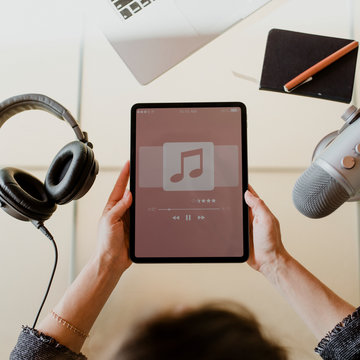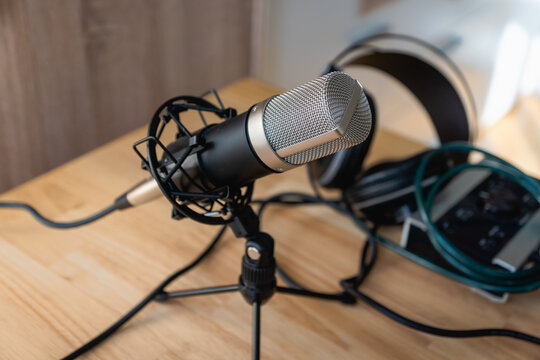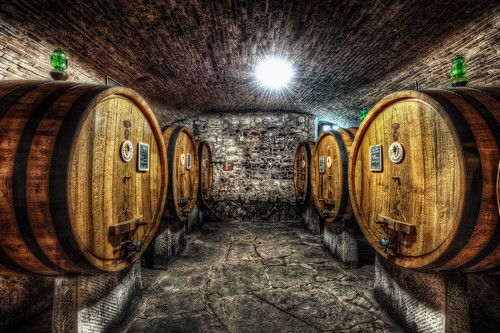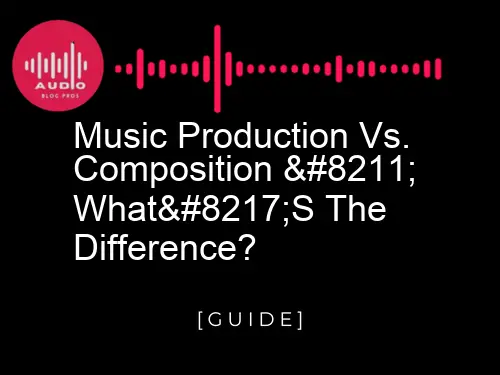If you’re a music enthusiast, you may have heard of production and composition but do you know the difference between them? Production and composition are two distinct aspects of music making that require different skill sets, knowledge and expertise. In this blog post, we’ll explore the differences between these two disciplines and uncover why they both play an important role in creating music. So, what are the key distinctions between music production and composition? Read on to find out!
Table of Contents

What is Music Production?
Music production is the process of creating and arranging music, while composition is the creation of new music from scratch. Both activities involve a great deal of creativity, but there are some key differences between them.
Music production typically involves working with other musicians to create a finished product, while composition is more solitary in nature. Music production typically focuses on creating a finished product, while composition often involves experimentation and creating works that are not necessarily finished.
Another key difference between music production and composition is that music production typically focuses on creating melodies and harmonies, while composition often involves creating new sounds and textures. Music production is also often focused on creating a finished product, while composition can be more experimental.
Despite these key differences, there are some significant similarities between music production and composition. Both activities involve a great deal of creativity, and both can involve working with other musicians to create a finished product. Additionally, both activities can involve experimentation and creating works that are not necessarily finished.
What is Music Composition?
Music composition is the process of creating a musical work, from start to finish. This may include the idea for the piece, writing the music itself, arranging and orchestrating it, recording it with an orchestra or working with a choir, and finally mixing it all together into a finished product. There are many different ways to compose music, but the end result will always be music.
Composing music can be quite creative and challenging work. It takes imagination and skill to come upwith new melodies and harmonic ideas that can support a song’s message or feelings. It’s also important to understand how different elements of music – such as rhythm, harmony, melody and texture – interact with each other in order to create a cohesive whole. If done correctly, composing can bring beauty and emotion to life in ways that nothing else can.
Similarities Between Music Production and Composition
There are a few key similarities between music production and composition. Both activities involve creating or arranging sounds to create a melody or rhythm, respectively. Additionally, both disciplines rely on creativity and imagination to produce results that may be unique from other works. However, there are also several key differences between the two fields. For example, music production typically deals with producing commercially viable recordings while composition is more often used in art settings. Additionally, music production is often reliant on technology while composition can be performed by hand or with limited equipment.

Differences Between Music Production and Composition
When it comes to music production, most people would say that the focus is on creating and producing tracks, whilst composition focuses more on writing original pieces of music. However, there are many similarities between the two tasks which make them both extremely important in the music industry.
Firstly, both music production and composition involve a great deal of creativity – whether it’s coming up with new sounds or composing lengthy pieces of music that are completely unique. In addition, both tasks require a great deal of technical expertise – whether it’s understanding soundwave frequencies or mixing together different tracks to create a cohesive masterpiece.
Finally, both music production and composition can have an enormous impact on a track’s success. By creating well-produced tracks that replicate commercial hits, musicians can earn serious money from their work. Conversely, if you are talented enough to write world-class compositions , your skills could ultimately lead to greater opportunities in the music industry.

The Role of Technology in Music Production
Technology-Assisted Music Production
The role of technology in music production has seen a lot of change in the past few years. Back in the days, most music was produced with analog gear and builders like Phil Spector were considered legends for their skill with this equipment. But times have changed; today, nearly every musician creates electronic music using some form of digital audio workstation (DAW) or software synthesizer. And while there are still plenty of great producers out there who use vintage analog gear to create unique sounds, it’s clear that technology has a big impact on the way modern music is created.
One reason why technology plays such an important role in music production is because it allows musicians to work on a large scale without having to rely on other people. In the past, musicians would have to get permission from other people before they could record a song or make a video, and this process could often take weeks or even months. But with DAWs and software synthesizers, musicians can now work on their projects in isolation and without any interference. This allows them to create music with a greater level of detail and precision, which is why technology is so often used in music production.
But technology isn’t the only factor that contributes to the rise of music production. In addition, the way that music is consumed has also changed dramatically over the past few years. For example, streaming services like Spotify have made it easier than ever for people to listen to music online. And because most music today is produced in a digital format, it’s easy for people to listen to it on their phones, computers, and other devices. This has made music production an even more important skill for musicians, as it allows them to create music that can be enjoyed by a large audience.
Digital Audio Workstations for Composing
Digital audio workstations (DAWs) have become a staple in music production, due to their ability to provide features and tools that can be very beneficial for composing. While not all DAWs are created equal, they offer various capabilities that can help with the creation of music. In this article we will be discussing some of the different uses for DAWs when it comes to composing music.
When it comes to composing, one of the main benefits of using a DAW is its ability to provide a wide range of tools and features that can help with the creative process. For example, many DAWs offer powerful sound editing tools, which allow you to easily tweak sounds and microphone settings while recording. This makes it easy to get the sounds you want, without having to go through a lot of trial and error.
Another great feature of DAWs is their ability to easily export audio files. This means that you can easily create finished music tracks, without having to worry about losing any data or files. This is a huge time-saver, especially if you are working on a large project.
While not all DAWs are created equal, they offer a wide range of features that can be very helpful for composing music. If you are looking for a tool that can help you with the creative process, a DAW is a great option.
The Pros and Cons of Automated Mixing Software
Since the inception of music production, one of the most important and powerful tools has been technology. Technology has allowed music producers to create, record, remix and produce music in a much easier way than ever before. With digital audio workstations (DAWs), composers can use synthesizers, drum machines and other sound generators to create entire tracks without ever having to play any instruments or even hear them played live.
However, this ease comes with a price tag; DAWs are often very expensive, especially if you want quality plugins and effects that simulate real-world instruments and sounds. Additionally, many DAWs come with built-in automation software that makes it easy for composers to mix together multiple tracks manually or using automated mixing software.
While automation is great for quick and easy mixes, it can also be limiting in terms of creativity. For example, if you want to add a vocal track to your mix, you may have to use automation to raise or lower the vocals in the mix to the correct level, which can be time-consuming and limiting. Additionally, many DAWs do not allow for much creativity when it comes to sound design; you are usually limited to using presets or templates that were created by the software’s developers.
On the other hand, composition is one of the most important aspects of music production. A good composition will make your music stand out and sound unique. In order to create good compositions, you need to have a good understanding of music theory and be able to write catchy melodies. Many composers also use electronic instruments and sounds to create a more experimental sound.
Overall, DAWs are great for quickly and easily producing music, but they are not perfect and require a good understanding of both music production and composition in order to create great sounding tracks.
Utilizing MIDI to Create Sounds
One of the most important aspects of music production is the ability to create and improve sounds. This can be done through a variety of means such as recording live instruments in a studio, using sequencers or drum machines, or even creating digital samples. However, it is often difficult to change sounds once they have been created, which is where technology comes into play.
There are several different types of technology that can be used in music production. One example is MIDI sequencing software. MIDI stands for Musical Instrument Digital Interface and allows computers to communicate with musical instruments. This allows producers to manipulate sounds easily by commanding keyboards, guitars and other electronic equipment via software. In addition, this type of software often includes sound effects and synthesizers that allow producers to create unique sounds.
Another type of technology that is often used in music production is digital audio workstations (DAW). DAWs are computer systems that allow producers to record, mix and edit sounds. They can also include features such as virtual instruments, which allow producers to create sounds without having to use real instruments.
Overall, technology is an important part of music production. It allows producers to create sounds quickly and easily, and to change them without having to re-record the entire song.

The Role of Creativity in Music Composition
The Creative Process of Music Composition
In today’s music industry, there is a constant battle between the two main types of musical creators – those who specialize in music production and composition, and those who focus on creating melodies and lyrics. However, despite the differences between these two approaches to making music, at their core, both music production and composition involve creativity.
Producers create songs by assembling tracks that are then mixed together to create a complete soundtrack or song arrangement. Composers write original melodies and lyrics, which can be reused in other songs or incorporated into existing pieces as remixes or covers. The key difference between these two roles is that producers are often required to use pre-existing sounds or MIDI files to create their tracks, whereas composers are able to craft entire songs from scratch.
Since both music production and composition involve creativity, the role of creativity in the creative process is an important consideration when discussing these two fields. According to The Creative Process of Music Composition textbook by Gordon & Neely, “There are a number of ways to look at creativity: as the ability to generate new ideas; as the ability to transform old ideas into something new; or as the ability to find solutions to problems.” All three of these perspectives are necessary for composing successful songs.
Producers must be able to generate new ideas by coming up with fresh sounding tracks that can be mixed together seamlessly. Composers must be able to transform old ideas into something new by creating catchy melodies that can stay in people’s minds long after they hear them. And finally, composers must be able to find solutions to problems by making sure that their songs are structurally sound and properly paced.
Creativity is not the only important factor when it comes to music composition. A number of other factors also need to be considered, including structure, melody, lyrics, rhythm, and timing. Each of these elements must be balanced in order for a song to be successful. For example, too much structure can make a song feel stiff and artificial; too little structure can result in a chaotic mess. mixup the order of chords in a song and you’ll ruin its flow; mismatch the timbre of different instruments and you’ll create jarring sounds. When it comes to composing music, there is no such thing as a “perfect” song. It’s important to experiment and try different things until you find something that works well for you.
In conclusion, both music production and composition involve creativity, but the two fields have different requirements for that creativity. Music production relies heavily on pre-existing sounds or MIDI files, while composition requires the ability to generate new ideas, transform old ideas into something new, and find solutions to problems. While both fields require creativity, the role of creativity in the creative process is an important consideration when discussing these two fields.
Analyzing the Creative Elements of Music Production
Creativity is often associated with music production, while composition is thought of as the more cerebral side of music. But what’s the difference between these two creative disciplines? And how do they contribute to the art of music?
To answer these questions, it’s important to first understand the creative process. In music production, creativity is key in coming up with new ideas and sounds. This can be done through The Creative Process of Music Composition or by using various software tools like Maschine or Ableton Live. Composers, on the other hand, focus on creating unique musical pieces that tell a story or convey a message. They may use techniques like orchestration or formal analysis to achieve this goal.
So creative skills are essential in both music production and composition, but they approach the art in different ways. Music production is all about creating new sounds and ideas, while composition is more about developing a unique vision and creating a coherent piece of music.
Ultimately, creativity is at the heart of both music production and composition. It’s what drives artists to come up with new sounds and ideas, and it’s what makes each piece of music unique.
Exploring the Creative Benefits of Both Music Production and Composition
In this day and age, it seems as if everyone is trying to be a musician. But what separates the truly skilled creators from the rest? creativity. Both music production and composition involve creative elements, but which one is more important? In this article, we will explore the role of creativity in both music production and composition and discuss their respective benefits.
First and foremost, both music production and composition require creativity. Whether you’re coming up with new sounds or writing inspiring lyrics, you need to have imagination in order to create something new. This ability to think outside of the box is a key ingredient for success in any creative field, including music.
On top of that, both music production and composition offer different creative benefits. Music production provides you with the opportunity to create new sounds and genres. This can be a huge advantage if you want to make your own music, rather than relying on pre-existing tracks. In addition, producing your own music allows you to control the element of sound quality. Composers can take this one step further by creating complex pieces that require intricate orchestrations and noises.
Overall, creativity is an essential part of both music production and composition. If you want to achieve success in either field, be sure to cultivate your creative side!
Finding the Right Balance Between Creativity and Technical Skill
One of the biggest benefits to music composition is that it allows for an artist to explore their creative side. That said, there is a balance between creativity and technical skill that must be upheld in order to produce quality music. Too much creativity may result in a product that is unpolished or poorly written, while neglecting technical skill can lead to amateurish or rushed work. It is important for composers and producers to strike the perfect balance between these two elements in order to create high-quality music.

Advantages of Music Production vs Composition
There are many advantages to being a music producer over a music composer. For one, music production is more hands-on than composition. Producers are often responsible for all aspects of the music production process, from writing and recording the songs to producing the album artwork and marketing the album.
Another advantage of music production is that it can be more financially lucrative than composition. Producers often receive a percentage of the profits generated by the songs they produce, which can be much higher than the royalties earned by composers who write original music.
One disadvantage of music production is that it can be less creative than composition. Producers are often limited in their ability to create new sounds and melodies, which can make their job more routine than creative.
In the end, it is important to remember that there is no “right” way to be a music producer or composer. What works for one person may not work for another, and each person has to find their own way to produce or compose music that resonates with them and their audience.

Disadvantages of Music Production vs Composition
There are many similarities and differences between music production and composition. While both tasks involve creating music, the two approaches to composing can be very different. Here we’ll explore some of the key distinctions between the two processes.
One of the main differences between music production and composition is that composition typically involves crafting a single, complete piece of music, while production often involves working on multiple tracks or projects at once. In addition, while most compositions are written down in advance, music production often involves making decisions as they happen – a difference that can lead to more creative freedom.
Another key distinction between the two is that composition usually focuses on acoustic instruments while production often includes electronic elements. This can lead to different sounds and textures being produced, as well as different styles of composition depending on whether acoustic or electronic instruments are used.
Finally, one advantage of composing over producing is that it allows for greater flexibility in terms of timing and arrangement – features that can be difficult to replicate when working with pre-existing recordings. On the other hand, productions can create less artificial sounding music than compositions due to their use of synths and other audio effects.
Though there are significant differences between these processes, it’s important to remember that both compositional skills and musical engineering principles apply across all genres and styles of musicmaking. So regardless of whether you’re a budding composer or producer looking to improve your workflows or abilities, learning how to integrate technology into your process will help you achieve great things!
In conclusion, music production and composition are two distinct yet related disciplines. While they both involve the creation of music, they differ in terms of their approaches and the tools used. Music production is more technology-driven, while composition is more creative. Each has its own advantages and disadvantages, but ultimately it comes down to personal preference. If you’re interested in learning more about either of these disciplines, be sure to check out our other content for more information.


